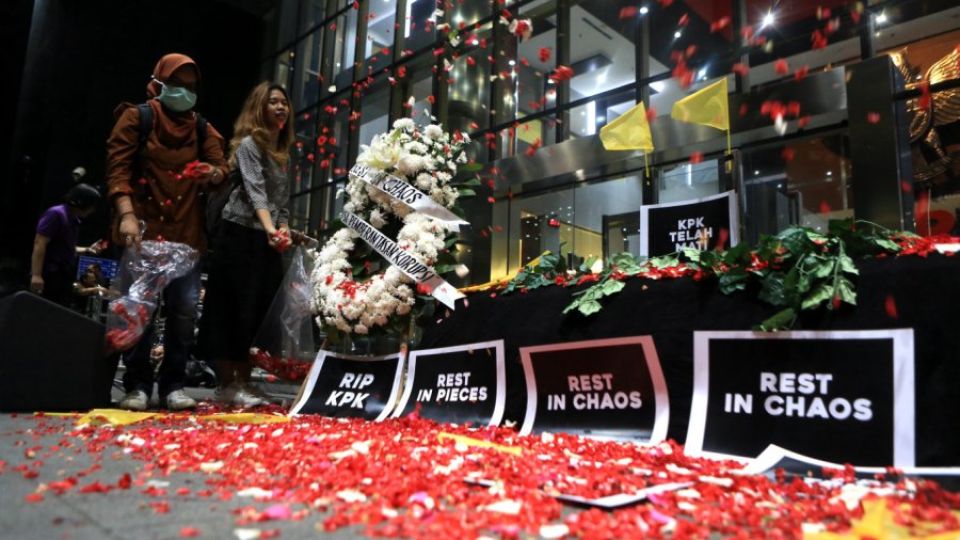October 13, 2023
JAKARTA – One year before the end of Joko “Jokowi” Widodo’s presidency, his administration is likely to leave behind one of the worst eras of corruption in the country’s history since the reform, activists have concurred.
The country’s progress on graft eradication was stunted by five ministers of Jokowi’s cabinet being named suspects by law enforcers in corruption cases. The number is likely to increase soon as reports suggest that the Corruption Eradication Commission (KPK) has named former Agriculture Minister Syahrul Yasin Limpo as a suspect in an alleged graft case in his ministry.
The antigraft body is expected to summon Syahrul on Wednesday to be interrogated.
Months before Syahrul became embroiled in the alleged graft case, Jokowi’s cabinet lost Communications and Information Minister Johnny G. Plate after he was named a suspect by the Attorney General’s Office in a graft case pertaining to the government’s 4G telephony project.
The prosecutors’ indictment later revealed that he was accused of receiving Rp 17.8 billion (US$1.1 million) in kickbacks for the project.
Other members of Jokowi’s cabinet involved in corruption include former Maritime Affairs and Fisheries Minister Edhy Prabowo, former Youth and Sports Minister Imam Nahrawi and former Social Affairs Ministers Juliari Batubara and Idrus Marham, who were convicted in separate cases.
Ministries and state institutions have become home to the second highest number of corruption cases, with 291 cases entangling the institutions since 2014, when Jokowi first came into office, according to data from the KPK as of Oct. 6. Regional administrations sat in the top spot with 499 cases.
Read also: Analysis: Indonesia today more corrupt than when Jokowi took charge
The rampant corruption found in those institutions also affected Indonesia’s Corruption Perception Index (CPI) published annually by Transparency International. The index ranges from zero, which indicates that a country is “highly corrupt”, to 100, indicating a “very clean” country.
When Jokowi was first elected in 2014, the score was 34. It reached its peak in 2019 at 40. But the country scored a four-point drop from 38 in 2021 to 34 last year.
The drop was “the most drastic decline” since 1995, according to Wawan Suyatmiko, deputy secretary-general of Transparency International Indonesia (TII).
Weakening antigraft body
The stagnant CPI between when Jokowi was first elected and the last years of the President’s time in office showed a lack of significant change in terms of corruption eradication during his nine years of reign, said Indonesia Corruption Watch (ICW) activist Diky Anandya.
At the end of Jokowi’s first term in 2019, the House of Representatives passed a revision to the KPK Law despite widespread opposition from experts, activists and the public.
The new law gives power to the newly formed KPK supervisory council to approve or reject arrests, searches and wiretaps of people of interest in graft cases. According to the previous law, KPK investigators only needed the approval of the commission’s five leaders.
The revised law also requires all KPK employees, including forensic auditors, investigators and prosecutors, to be civil servants, which analysts feared would lead to potential conflict of interests and loss of independence.
“The revision of the KPK Law […] has become a turning point for the KPK because the law puts it under the President’s authority, thus diminishing its authority,” Wawan of TII said.
The KPK now, he added, does not perform as an antigraft body, but is more focused on dealing with internal affairs, including leaders with “degraded integrity and morals”, while the institution itself has become “the executive’s political tool.”
Read also: Critics call on Firli to step down amid police probe into extortion allegation
Most KPK leaders have been embroiled in allegations of ethics violations, including chairman Firli Bahuri, an active police general, who was repeatedly accused of committing ethics infringements.
Among the latest occurrences involved the circulation of photograph showing Firli and former Minister Syahrul in a private meeting on a badminton court. Speculation arose that the image was proof that Firli met Syahrul and extorted S$1 billion from him. Firli dismissed the rumor.
There was no hope that Jokowi could clean the KPK of corruption during his last year in office, which will end next October, according to Wawan.
But Diky of ICW begged to differ, as a government-sanctioned judicial reform team had recommended that the executive power immediately revise the KPK Law to make the antigraft body independent again.
The team had also urged the passage of the asset forfeiture bill that would regulate illicit enrichment even further than the current version of the Anticorruption Law. Jokowi sent a letter to the House of Representatives in May to push legislators to expedite deliberation on the bill.
“But there is barely any news at all on the bill as of today,” Diky said. (alf)


